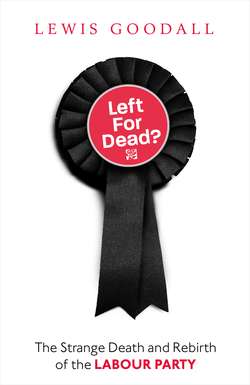Читать книгу Left for Dead?: The Strange Death and Rebirth of the Labour Party - Lewis Goodall - Страница 25
THE POLITICAL CONSEQUENCES OF MR MILIBAND
ОглавлениеEric Joyce was not alone in Westminster in being an MP with an alcohol problem. He was, nonetheless, one of the relatively small number who would follow it up with a punch, or five, and one of the smaller number still who would do it on the palace grounds. But punch he did and it led to his stepping down as the Labour candidate for Falkirk in the pending general election. The consequences would be greater than even his victim’s chin could feel at the time – a left hook that proved a boon, for the left wing. There is a direct line from that punch to me standing waiting for Jeremy Corbyn at the Labour Party conference, at the Durham Miners’ Gala, in a Stornoway leisure centre, in Perth conference hall and Zaatari refugee camp in northern Jordan. A direct line to all those people standing there on that Brighton September evening. Were it not for that, none of it might have happened, or at least happened in the way that it did.
Joyce’s stepping down initiated a swift selection contest in Falkirk, the details of which need not detain us long. In brief, it looked like a union stitch-up for Unite. Guess what – it was a union stitch-up for Unite. Hold the front page. It’s the Labour Party. Stitching things up has been its MO since 1900. But for some reason that neither I nor anyone else I interviewed can quite remember, it caused fire and fury in the press.† ‘Pressure mounted’ as it so often apparently does and Miliband concluded that something must be done. To deflect attention, he came up with a wheeze. He would abolish the electoral college where the Labour leadership and deputy leadership were decided via the infamous ‘a third, a third, a third’ formula. To recap, a third of the weighted votes went to the MPs, a third to the trade unions and affiliate organisations, and a third to the membership at large. The system, designed to diffuse power throughout the party while also maintaining the disproportionate influence of MPs and the unions, had thrown up several arcane anomalies, much loved by the Mail and the Tory Party. For a start, it was complex: David Miliband had been ahead for several rounds and the choice of the membership at large. This was the first time since the inception of the system (it had been used three times before) that the winning candidate did not win clearly in all three sections.‡ It thus created a legitimacy crisis. His younger brother had got the position through union votes. Endless cartoons and editorials implying that Ed was the puppet of Unite’s general secretary, Len McCluskey, had been damaging. Ed proposed to cut the strings:§ he would introduce the principle of ‘one member, one vote’ to the leadership electoral system. He sold it as a diminution of union power. It would end the absurd situation where certain people had multiple votes by virtue of their being members of different parts of the party.
And Ed Miliband wasn’t done there. Not content with changing the nature of the election he wanted to change the people who could vote in it. He proposed wholesale changes to the electorate, making it much easier to get involved with the election as a member of the public. All you had to do was become a ‘registered supporter’ (not even a full member) of the party for about the same cost as a latte (£3). You could then, under the new ‘one member, one vote’ rules, have as much influence on the outcome of the leadership contest as an MP of 30 years’ standing or a trade union leader or party member who joined under Clement Attlee. This was an extraordinary transformation. As recently as 1981 (and for eight decades before) the leadership had been the preserve solely of Labour MPs. As Miliband said on the day of the special conference in 2014: ‘All of these things happened, not because leaders made them happen, but because people and movements made them happen. Today if you vote for these reforms you will be voting for Labour to be a movement again.’
Ed Miliband had no idea just how accidentally prophetic his words were. Whatever the rights and wrongs of the new members, their importance in the 2015 contest can’t be overstated. Of 105,598 members who joined the party that feverish summer, no fewer than 88,449 voted for Corbyn. There can be little doubt that they joined specifically to vote for Corbyn, as opposed to being won over during the contest. Miliband had created a system ripe for mass entryism. Just one tiny example by way of illustration: on day one of the leadership contest, literally hours after Corbyn had apparently miraculously made it on to the ballot paper, the Green Party tweeted its support and members began openly discussing the prospect of registering to support his candidacy.
